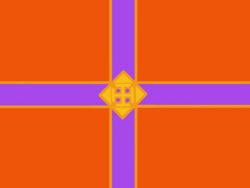Flags of North Bardonia: Difference between revisions
| Line 11: | Line 11: | ||
==== Governorate of Straits Settlement ==== | ==== Governorate of Straits Settlement ==== | ||
=== Kingdom of North Bardonia === | === Kingdom of North Bardonia === | ||
[[File:NorthBardonia.png.png|thumb|250x250px|The flag used from 1896 to 1933 and again from 2018 to now. The flag remains a symbol of the Monarchist movement in North Bardonia.]] | |||
The flag of modern-day North Bardonia and the flag of the late Kingdom of North Bardonia are exactly identical. Designed in 1885 by Steffon Croust (A prominent North Bardonian artist) to represent the struggle of the lands people. Commision by the National Liberation Movement the orange was said to symbolize the land, arid and dry, the purple to represent its heritage, contain the colour of Carthiada and late was a symbol of the monarchy, and finally the gold representing the richness of the land, the culture, and the people. At the flags heart was the classical symbol of Carthiada: The Square turned on with the cross of the Faith and purple dots representing the trade alongside the four triangles that represented the four quarters of society. | |||
=== Republic of North Bardonia === | === Republic of North Bardonia === | ||
=== Modern North Bardonia === | === Modern North Bardonia === | ||
Revision as of 10:28, 6 August 2024
Throughout the many years the Flags of North Bardonia and its predecessors states have changed and evolved throughout the many centuries. Each of the numerous states that have adopted there own local flags.
Historic National Flags
Ancient Carthiada
Kharistan
Viceroyalty of North Bardonia
Governorate of Straits Settlement
Kingdom of North Bardonia
The flag of modern-day North Bardonia and the flag of the late Kingdom of North Bardonia are exactly identical. Designed in 1885 by Steffon Croust (A prominent North Bardonian artist) to represent the struggle of the lands people. Commision by the National Liberation Movement the orange was said to symbolize the land, arid and dry, the purple to represent its heritage, contain the colour of Carthiada and late was a symbol of the monarchy, and finally the gold representing the richness of the land, the culture, and the people. At the flags heart was the classical symbol of Carthiada: The Square turned on with the cross of the Faith and purple dots representing the trade alongside the four triangles that represented the four quarters of society.
